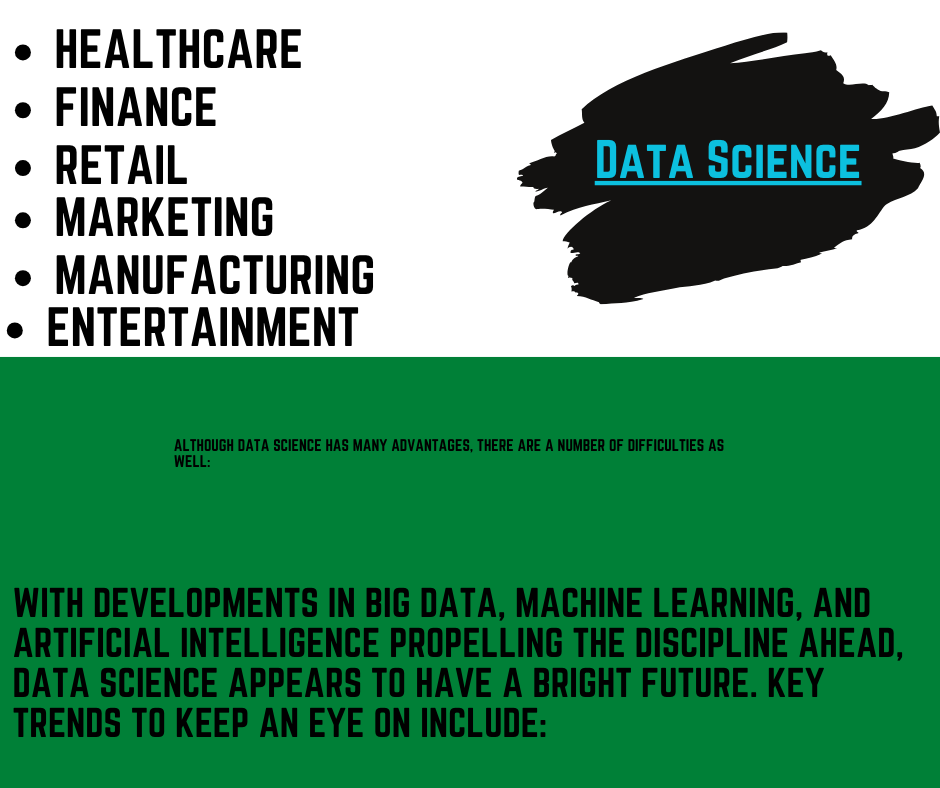The multidisciplinary subject of data science uses scientific procedures, systems, algorithms, and methodologies to glean insights and knowledge from both structured and unstructured data. To comprehend and evaluate complex data sets, it integrates elements of computer science, statistics, mathematics, and domain-specific expertise. The need for data-driven decision-making in corporations and organizations has made data science essential across a range of industries.
The Fundamental Elements of Data Science
Data gathering: Information is the cornerstone of any data science endeavor. Numerous sources, such as databases, online archives, Internet of Things devices, social media, and more, might yield data. The gathered information may be unstructured, such as text, photos, and videos, or structured, such as databases and spreadsheets.
-
- Data cleaning: Inconsistencies, mistakes, duplicates, and missing values are frequently found in raw data. Preprocessing this data to enhance its quality is called data cleaning. To get data ready for analysis, methods including imputation, normalization, and standardization are frequently employed.
- Data Science: Prior to doing intricate studies, data scientists go into data exploration to comprehend the fundamental patterns and distributions inside the data. For the purpose of producing graphs, charts, and dashboards that facilitate data interpretation, visualization tools such as Tableau, Seaborn, and Matplotlib are indispensable.
- Modeling and Statistical Analysis: To find patterns and relationships in the data, statistical methods are applied. This covers regression analysis, predictive modeling, and hypothesis testing. To forecast or categorize data, machine learning models like neural networks, decision trees, and linear regression are used.
- Machine Learning: Machine learning is a major branch of data science that deals with teaching algorithms to identify patterns in data and come to conclusions. The methods include reinforcement learning, unsupervised learning (like clustering and dimensionality reduction), and supervised learning (like regression and classification).
- Big Data Technologies: Conventional data processing technologies are frequently insufficient in light of the emergence of big data. Large-scale dataset processing and storage are made possible by technologies like Hadoop, Spark, and NoSQL databases in distributed computing settings.
Data Interpretation and Communication: Effectively communicating the results is the last stage of the data science process. Stakeholders must be presented with data scientists’ ideas in an understandable and practical way. Often, this entails producing presentations, reports, and visualizations that highlight important conclusions and suggestions.
Data Science’s Effect on Various Industries
-
- Healthcare: Predictive analytics, tailored medicine, and better patient outcomes are all achieved with the help of data science. Algorithms using machine learning are able to forecast illness outbreaks, pinpoint possible cures, and streamline hospital procedures.
- Finance: Data science is used by financial firms for algorithmic trading, risk management, and fraud detection. They can reduce risks and make better investing selections by examining transaction patterns and market data.
- Retail: Data science is used by retailers to streamline supply chains, improve consumer experience, and target marketing campaigns. Targeted marketing and better inventory control are made possible through the analysis of consumer behavior and preferences.
- Marketing: Data science aids in the knowledge of consumer behavior, audience segmentation, and campaign efficacy measurement in marketing. Ad spending may be maximized and trends can be predicted with predictive analytics.
- Manufacturing: The application of data science in this sector can enhance supply chain optimization, predictive maintenance, and quality control. Finding bottlenecks and cutting downtime are made easier with the use of production data analysis.
- Entertainment: Data science is used by streaming services like Netflix and Spotify to make content recommendations based on customer tastes. By examining listening and watching patterns, they are able to customize recommendations for each user.
Transportation: The optimization of routes, reduction of fuel consumption, and enhancement of safety are all made possible by data science. Ride-sharing businesses improve price by matching supply with demand using real-time data.
Difficulties and Ethical Issues
Although data science has many advantages, there are a number of difficulties as well:
-
- Data privacy: Strict privacy precautions must be taken when handling sensitive data, particularly personal data. Misuse of data and data breaches can have detrimental effects on the law and society.
- Fairness and Bias: Machine learning models have the potential to reinforce preexisting biases in the training set, producing unfair or discriminating results. Ensuring algorithms are transparent and fair is essential.
- Interpretability: Deep neural networks and other complex models frequently function as “black boxes,” making it challenging to comprehend the decision-making process. Gaining the trust of stakeholders requires developing interpretable models.
- Scalability: Growing data quantities make it difficult to scale data processing and storage. To handle large data, effective algorithms and distributed computing solutions are required.
- Skill Gap: Data scientists are in great demand, but the field calls for a certain set of abilities in programming, statistics, and domain expertise. Closing this talent gap is critical to the advancement of data science.
Data Science’s Future
With developments in big data, machine learning, and artificial intelligence propelling the discipline ahead, data science appears to have a bright future. Key trends to keep an eye on include:
Automated Machine Learning (AutoML): AutoML technologies are democratizing access to advanced analytics by making it simpler for non-experts to develop and implement machine learning models.
-
-
- Explainable AI: It’s becoming more and more important to develop methods to improve the interpretability and transparency of AI models, particularly in regulated businesses.
- Edge computing can lower latency and boost efficiency by processing data closer to the source rather than depending on centralized cloud servers, especially for Internet of Things applications.
- Quantum computing is still in its infancy, but it has the ability to solve complicated puzzles far more quickly than traditional computers, which could lead to new developments in data science.
- Ethical AI: Creating AI systems that are moral, just, and consistent with society norms is becoming more and more important. It is imperative that foundations and criteria for ethical AI be established.
-


